Date: (01-01-0101), TIME: N/A
– ID: , Passcode:
N/A
Live on: YouTube : @KSASTALK
KSAS Talk Series - YouTube
Visit https://www.youtube.com/@KSASTALK to view past KSAS Talk Series and check out our upcoming events!
Meeting link: https://us06web.zoom.us/j/86257583170?pwd=1pk0d3ALZqCkxu8BUzNWJHNN6g5Jtv.1
Date: (28-01-2026), TIME: 4 PM (IST) / 5:30 am (EST)
KSAS TALK LECTURE SERIES – ID: 862 5758 3170, Passcode:
130612
Live on: YouTube : @KSASTALK
SPEAKER’S PROFILE
Professor Abhishek Kumar Tiwari is a law professor at the University of Lucknow, where he currently serves as the Additional Dean of Student Welfare at the II Campus. With over 16 years of teaching and academic experience, he has taught at several prestigious institutions, including the University of Lucknow, the University of Rajasthan, Dr. Ram Manohar Lohia National Law University, and Banaras Hindu University. Additionally, Professor Tiwari has held international teaching positions in Ethiopia. His academic expertise includes Constitutional Law, International Law, Human Rights, Intellectual Property Rights, and Environmental Law. His doctoral research focuses on the environmental implications of genetically modified crops, providing a critical analysis within the context of international environmental guidelines and national legal frameworks. His work demonstrates a strong interdisciplinary approach at the intersection of law, science, and public policy.
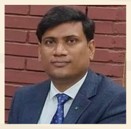
ABSTRACT
The Constitution serves as the foundational legal framework of the state, defining the structure of governance, distribution of powers, and fundamental rights of citizens. Constitutionalism goes beyond the written text, emphasizing limited government, the rule of law, separation of powers, and accountability of authority. Constitutional morality acts as the ethical compass that guides institutions, public officials, and citizens to respect not merely the letter but the spirit of the Constitution. Together, the Constitution, constitutionalism, and constitutional morality sustain democratic governance, protect individual liberties, prevent arbitrary exercise of power, and ensure justice, equality, and dignity within a constitutional democracy.
130612
Meeting link: https://us06web.zoom.us/j/89475198582?pwd=eJ1wxUgSmIaUVbY2dgtB3Gwv5KjI8w.1
Date: (24-12-2025), TIME: 6 PM (IST) / 8:30 AM (EST)
KSAS TALK LECTURE SERIES – ID: 894 7519 8582, Passcode:
130612
Live on: YouTube : @KSASTALK
SPEAKER’S PROFILE
Professor Lallan Prasad (M.Com, LL.B., Ph.D.) is a distinguished academician born in Varanasi in 1939. He studied at Banaras Hindu University (BHU) and Chandigarh University, where he became a gold medalist at BHU. His Ph.D. was awarded with outstanding merit by Punjab University. He founded several university departments: Business Management at Punjabi University in Patiala and Gauhati University in Assam, as well as Business Economics at the University of Delhi, where he served as Head and Dean. His career includes positions as a Professor at Moscow State University, Director of the APJ Institute of Technology & Management, and Vice-Chancellor of Jaipuria University. Professor Prasad directed a World Bank project focused on the Yamuna wetland and has authored over a dozen books and hundreds of research papers. He has chaired sessions at various national and international conferences. Currently, he is the chairman of the Kautilya Foundation and serves on the governing councils of the Mahamana Malviya Mission and WAVES India. Additionally, he is an acclaimed Hindi poet and writer, receiving several awards for his literary contributions.
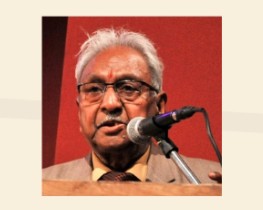
ABSTRACT
"Bharat Mata Gram Vasini," as poet Sumitra Nandan Pant said, remains true even today, as India has about 6.5 lakh villages governed by gram panchayats and supported by state-appointed gram sachivs. The rural economy contributes nearly 16% to India's GDP and provides 60% employment. In ancient Bharata, kings were responsible for village establishment, agricultural infrastructure, farmer welfare, and revenue collection - principles elaborated in Kautilya's Arthashastra. Even today, the rural economy can be significantly strengthened through scientific management of agriculture, irrigation, inputs, storage, marketing, infrastructure, basic services, rural industries, and governance. This study examines existing challenges and proposes reforms by integrating Kautilya's Arthashastra with the contemporary governance system.
Kuruom School of Advanced Sciences, Lucknow, India & Institute of Advanced Sciences (INADS), Dartmouth, MA, USA
Meeting link: https://us06web.zoom.us/j/6977021728?pwd=NlZWQ1p5d3BXQTdKWDhHUC95L3UxZz09&omn=81391795965
Date: (26-11-2025), TIME: 5 PM (IST) / 7:30 AM (EST)
KSAS TALK LECTURE SERIES – ID: 697 702 1728, Passcode:
130612
Live on: YouTube : @KSASTALK
SPEAKER’S PROFILE
Dr. Amaresh Kumar Singh is currently serving as an Assistant Professor in the Department of Zoology, Institute of Science, Banaras Hindu University (BHU), in Varanasi. He began his research career at BHU, working on stress and immune regulation mediated by pineal indolamines. He subsequently joined the Indian Institute of Technology Kanpur (IIT Kanpur) as an NPDF Fellow, where he investigated joint development and the regulatory roles of Smurf proteins. Following the completion of his NPDF tenure, he was awarded the prestigious Early Career Fellowship (ECF) from the Wellcome Trust/India Alliance (UK), enabling him to conduct independent research on the etiology of osteoarthritis and stress physiology. In 2019, he joined the Department of Zoology at BHU as an Assistant Professor.
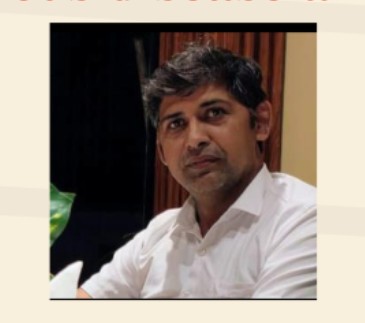
ABSTRACT
Osteoarthritis has long been perceived as an inevitable part of aging, yet it is now recognized as a serious, progressive disease and a growing global health challenge. In this talk, Dr. Singh will discuss the multifactorial nature of Osteoarthritis - spanning cartilage degeneration, chronic inflammation, metabolic dysfunction, and biomechanical stress and discuss why its rising prevalence demands urgent scientific and clinical attention. This talk aims to reframe osteoarthritis as a major concern for mankind, emphasize the need for early recognition and preventive strategies, and outline emerging avenues in research, personalized medicine, and regenerative interventions that offer hope for improved patient outcomes.
Kuruom School of Advanced Sciences, Lucknow, India & Institute of Advanced Sciences (INADS), Dartmouth, MA, USA
Meeting link: https://us06web.zoom.us/j/6977021728?pwd=NlZWQ1p5d3BXQTdKWDhHUC95L3UxZz09&omn=83004291517
Date: (30-10-2025), TIME: 5 PM (IST) / 7:30 AM (EST)
KSAS TALK LECTURE SERIES – ID: 6977021728, Passcode:
130612
Live on: YouTube : @KSASTALK
SPEAKER’S PROFILE
Dr. Ritu Tiwari is a professor in the department of Political Science at Karamat Husain Muslim Girls' P.G. College in Lucknow, India. She is also the Chief Trustee of the Peace and Development Charitable Trust. Dr. Tiwari holds a Ph.D. in Political Science from the University of Lucknow and has qualified for the UGC-NET. Her academic contributions include five books, ten edited chapters, and over twenty-five research papers. She is currently supervising four research scholars and has participated in numerous FDPs, workshops, and national & international seminars.

ABSTRACT
The foundation of good governance in the Indian knowledge tradition rests upon the principles of Dharma (righteousness), Nyaya (justice), and Lok Kalyan (public welfare). In this tradition, governance is not perceived as an exercise of power, but as a means of service. The principles of Raj Dharma (the duty of the ruler) inspire leaders to be moral, impartial, and devoted to public service. Justice is regarded as the essence of social balance and harmony, while public welfare is considered the ultimate objective of governance. In today's democratic and administrative framework, these ideals remain highly relevant and inspiring, manifesting through transparency, accountability, and ethical leadership. The discussion will focus on the ideals of good governance embedded in the Indian knowledge tradition - such as Raj Dharma, Nyaya, and Lok Kalyan - and explore their ethical and philosophical foundations, along with an analysis of how these principles continue to serve as guiding forces for contemporary systems of governance.
Kuruom School of Advanced Sciences, Lucknow, India & Institute of Advanced Sciences (INADS), Dartmouth, MA, USA
Meeting link: https://us06web.zoom.us/j/88594219697?pwd=5LlSGjsTePFmxGnant8vmSeNzcFcoe.1
Date: (09-09-2025), TIME: 7:30 PM (IST) / 10 AM (EST)
KSAS TALK LECTURE SERIES – ID: 885 9421 9697, Passcode:
130612
Live on: YouTube : @KSASTALK
SPEAKER’S PROFILE
Dr. Ashok Kumar is a Biomedical Scientist with more than four decades of experience working in academia and industry in India, Canada, and the United States. His first assignment was to set up clinical laboratory services at an upcoming super-specialty medical institution - Indira Gandhi Institute of Medical Sciences, located in Patna, Bihar. From there, he shifted to the University of Calgary, Canada, to undertake cancer research. He was offered an opportunity to join the faculty at Harvard Medical School (HMS) in Boston, MA, USA, through the Fogarty International Award from the National Institute of Health (USA). Upon leaving HMS, he returned to India to work at the Bhabha Atomic Research Center in Mumbai as a Senior Scientist and then at AKS University as Founder Vice Chancellor. He has also served as Vice Chancellor at the IIMT University, Meerut, UP. He continues to pursue his research interest to develop innovative therapeutic and nutraceutical products.
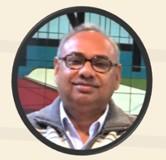
ABSTRACT
Chronic diseases account for about seventy percent of morbidity and mortality worldwide. Non-availability of safe and effective drugs to treat these diseases is largely responsible for this situation. Adverse drug reactions of chemical pharmaceuticals pose a significant challenge to safe healthcare. In view of this, there is growing interest worldwide in holistic healthcare systems like Ayurveda, which uses botanical drugs. Different species and subspecies of plants, environmental factors leading to epigenetic changes, result in a variation in the expression of active metabolites produced by the plants. Proper quality control and validation of the drugs are needed to gain global acceptance of such drugs.
Kuruom School of Advanced Sciences, Lucknow, India & Institute of Advanced Sciences (INADS), Dartmouth, MA, USA
Meeting link: https://us06web.zoom.us/j/87508258762?pwd=f3fhTsQiQUBglzwTTsEZ2iBPHxHKYH.1
Date: (30-08-2025), TIME: 5 PM (IST) / 7:30 AM (EST)
KSAS TALK LECTURE SERIES – ID: 875 0825 8762, Passcode:
130612
Live on: YouTube : @KSASTALK
SPEAKER’S PROFILE
Professor Ajay Chaturvedi is a Professor at the Indian Institute of Technology (IIT) in Mandi. He is a globally respected thought leader pioneering the integration of Vedic knowledge with contemporary science. An alumnus of BITS Pilani, Wharton, Harvard, and Lee Kuan Yew School, and a trained Vedanga Jyotisa Pandita. Professor Chaturvedi is the author of "The Lost Wisdom of the Swastika and Trilogy of Time" and redefines time as a cosmological and civilizational principle. He is the founder of HarVa and Kautilya Fellowship Network, where he champions sustainable, Dharmic economic models like the Kullhad Economy, and is honored by WEF and global institutions. His work bridges Indic wisdom with modern strategy, sustainability, and futuristic sciences.
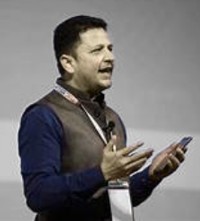
ABSTRACT
Based on Professor Ajay Chaturvedi's pioneering research on Vedic Time, his paper argues that true economic renewal begins with reclaiming time as defined in the Vedas - rooted in Rta, cosmic order - rather than as a mechanistic convention. Vedic timekeeping, with its ghatikas and sunrise-based cycles, provides a coherent philosophical and empirical foundation absent in modern science. Recasting economics upon this framework gives rise to the Kullhad Economy: a decentralised, nature-aligned, production-first model that shifts focus from accumulation to circulation, branding to making, and GDP to Garima (dignity). Proposed as a full-fledged curriculum culminating in a "Kullhad Economy Festival," this model connects students with real producers and regenerative practices. It offers India and the world a civilizational alternative for sustainable prosperity and rural renaissance.
Kuruom School of Advanced Sciences, Lucknow, India & Institute of Advanced Sciences (INADS), Dartmouth, MA, USA
Meeting link: https://us06web.zoom.us/j/89784614786?pwd=clOaBkNbkTykMlgnLN6Pw83RHs09Pg.1
Date: (11-07-2025), TIME: 4:30 pm (IST) / 7:00 am (EST)
KSAS TALK LECTURE SERIES – ID: 897 8461 4786, Passcode:
130612
Live on: YouTube : @KSASTALK
SPEAKER’S PROFILE
Dr. Kushagra Rajendra, a distinguished environmental scientist, brings over 17 years of academic and research excellence to the forefront. He is the Department Head and Associate Professor of Earth & Environment Sciences at Amity University Haryana. He holds a Master's, MPhil, and Ph.D. from Jawaharlal Nehru University (JNU) in Environmental Science. His book, "Dharti ka Nyaya," brings out contemporary discourse on the Man-Environment relationship for commoners.
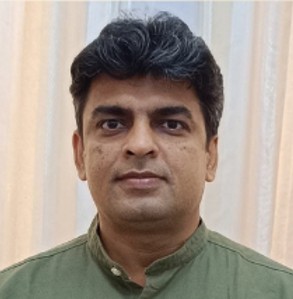
ABSTRACT
Upon this sacred Earth, there reigns a singular eternal truth that defies all else - change, the unyielding force that shapes our destiny! Since the genesis of our civilization, our bond with nature has unfolded as a majestic tapestry. It has evolved from wild creatures to skilled hunters, mastering the noble craft of agriculture, raising majestic cities, redefining our existence, and igniting the splendor of civilizations. Yet, in a dramatic turn over the past two centuries, our imprint on this planet has emerged with startling clarity, and in recent decades, this influence has transmuted into ominous repercussions.
Kuruom School of Advanced Sciences, Lucknow, India & Institute of Advanced Sciences (INADS), Dartmouth, MA, USA
Meeting link: https://us06web.zoom.us/j/84453142466?pwd=a6n1sAQWSlv0pyW4NUer0GvzH3GsPe.1
Date: (25-06-2025), TIME: 6:30 pm (IST) / 9 am (EST)
KSAS TALK LECTURE SERIES – ID: 844 5314 2466, Passcode:
130612
Live on: YouTube : @KSASTALK
SPEAKER’S PROFILE
Professor Alex Hankey earned a First in Natural Sciences from the University of Cambridge and a PhD in Theoretical Physics from the Massachusetts Institute of Technology (MIT). After completing a Lindemann Postdoctoral Fellowship at Stanford, he joined Maharishi International University as an Assistant Professor of Physics in 1973. There, he received instructions to explore the relationship between Western sciences and Vedic sciences, a project that continues to this day. Additionally, he studied Vedic sciences directly from Maharishi Mahesh Yogi in an Upanishad-style manner. Over the next 30 years, Hankey worked for Maharishi's organization in various capacities and countries, including organizing meetings in the UK Houses of Parliament. He developed a unique perspective on the science and philosophy of consciousness, utilizing concepts of critical phenomena and instability drawn from his PhD research. This perspective offers significant explanatory power across multiple fields. He has published over 130 articles in peer-reviewed scientific journals and contributed to several book chapters. Hankey is recognized on Stanford's 2% list of top academics and serves on the editorial boards of six scientific journals, primarily focusing on traditional, complementary, and integrative medicine.
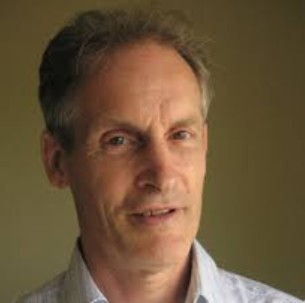
ABSTRACT
All ancient systems of biology and medicine recognized a concept of the Life Force that applies to animals, plants, and fungi—the only life forms they were aware of. In Ayurveda, this life force is referred to as 'Ayus,' which is also the origin of the name for Ayurveda. In traditional Chinese medicine (TCM), it is known as 'Chi,' which encompasses two aspects: Yin and Yang. This concept is not limited to living organisms but extends to every facet of our universe. All AYUSH systems acknowledge this concept as well. In Yoga, it is called Prana, representing the 'Life Breath.' Naturopathy refers to it as 'Vis Vitalis,' a term derived from ancient European medical systems, while Homeopathy uses the same term. Traditional systems broadly agree that a strong life force correlates with good health, whereas a weak life force is associated with increased susceptibility to disease. The alignment among these various systems is significant, especially considering that they developed largely independently across different regions of the world with minimal communication among them. In contrast, the scientific approach in the West favors a biochemical understanding of biology, which constructs theories of life based on biochemical reactions facilitated by enzymes. Biological scientists concluded that their understanding could not adequately explain a life force. Thus, in the 1930s, they dismissed the concept as unscientific and relegated it to the realm of ancient superstition, effectively banishing it from scientific discourse.
In the 1950s, the 'Molecular Biology Theory of Biology' emerged, focusing on the structures of DNA and RNA. However, this limited understanding failed to change the existing view of the life force, or vis vitalis. For nearly a century, scientific biology had no basis for reevaluating this opinion. Recently, biology has had to embrace significant advancements, including Hormesis and Fractal Physiology. These developments bridge the gap between genetics and the genetic code of molecular biology and introduce a new epigenetic component. Fractal Physiology, in particular, provides an optimized approach to epigenetics, enriching the biophysics fundamental to the field. This concept has previously been articulated by Professor Hankey at KURUOM. The integration of genetics and epigenetics has led to the creation of a new 'Sandwich Model of Biology.' This model incorporates critical instabilities related to the physics of phase transitions. Additionally, the development of a novel theory of Ayus, or the life force, will include properties suggested by fractal physiology.
Methods
Fractal Physiology has long been understood to rely on self-organized criticality (SoC). Previous research has demonstrated that the critical instabilities associated with SoC optimize the regulation of epigenetic switching processes. The existence of these critical instabilities fundamentally alters our understanding of the essential biophysics of life due to the impacts of critical point fluctuations. This insight has the potential to revolutionize our perspective on biological processes.
Results
The presence of critical instabilities that optimize system responses allows for a new theory of the life force, encompassing all desired properties. Specifically, hormesis suggests that critical point fluctuations from these instabilities interact to create what are known as "Critical Points of Higher Order." These critical points then couple along a cell's extensive biochemical pathways—numbering in the thousands—to produce what can be termed "Critical Points of Ultra-High Order." In cells, the range of critical coherence expands from molecular sizes to that of the entire cell, resulting in a mesoscopic critical coherence. This phenomenon appears to possess all the attributes traditionally associated with the life force, as optimal regulation can be equated with good health.
Discussion
Epigenetics refers to the regulation of gene activity. Many biologists believe it simply involves turning a gene 'on' or 'off.' However, the reality is much more complex, as there is a continuous process of 'up' and 'down' regulation that allows for precise matching of enzyme production to cellular needs. This regulation can and should be optimized. The new model of the life force presents the functioning of each cell as holistic, as the overall critical coherence expands to encompass the entire cell. This perspective aligns with traditional systems of medicine and contrasts with the "reductionist thinking" of modern science. While it is true that life involves enzyme-facilitated biochemical reactions, it is incorrect to conclude that life is merely these reactions. In reality, life consists of optimized enzyme-facilitated biochemical reactions. Optimization arises from the enhancement of response processes, which necessitate critical instabilities—these are vertical points of inflection in all response functions. These instabilities produce the critical coherence that underlies fractal physiology. Everything is self-consistent.
Kuruom School of Advanced Sciences, Lucknow, India & Institute of Advanced Sciences (INADS), Dartmouth, MA, USA
Meeting link: https://us06web.zoom.us/j/89388804550?pwd=bw9n4bPaZ8LtHf2e2ex0a2a4MaZAjS.1
Date: (30-05-2025), TIME: 5 PM (IST) / 7:30 AM (EST)
KSAS TALK LECTURE SERIES – ID: 893 8880 4550, Passcode:
130612
Live on: YouTube : @KSASTALK
SPEAKER’S PROFILE
Dr. Bhawna Sharma is currently serving as the Head and Associate Professor at the School of Humanities and Social Sciences at Geeta University, Panipat. With over 12 years of teaching experience, she has held academic positions at esteemed institutions, including the University of Delhi, the Indian Military Academy (IMA) in Dehradun, Jawaharlal Nehru University (JNU), Amity University Noida, and the School of Open Learning at the University of Delhi. Dr. Sharma holds an M.Phil and PhD from Jawaharlal Nehru University, New Delhi. She has made significant contributions to academia through her research, with publications in Scopus-indexed and UGC-CARE-listed journals, as well as several book chapters and review papers in both national and international publications. Additionally, she has authored two units for the Ministry of Education's E-Pathshala initiative. Her key areas of interest include child trafficking, the African Union, Nationalism, Human Rights, and International Affairs.
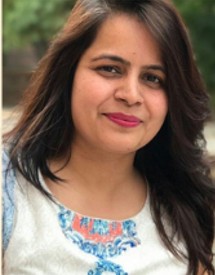
ABSTRACT
The Bharatiya Nyaya Sanhita marks a new beginning for India's justice system, combining modern legal ideas with the wisdom of ancient Indian traditions. Replacing old colonial laws, it aims to create a justice system that reflects India's own culture and values. Inspired by ancient texts like the Manusmriti and Arthashastra, it promotes fairness, duty, and balance. This new law focuses not only on punishment but also on restoring harmony in society. It is a step towards a justice system that is both effective and deeply rooted in India's long-standing principles of truth, responsibility, and moral justice.
Kuruom School of Advanced Sciences, Lucknow, India & Institute of Advanced Sciences (INADS), Dartmouth, MA, USA
Meeting link: https://us02web.zoom.us/j/84315817997?pwd=1bUrxL5BxxCB1rV3pKCYu1dnXnMkhb.1
Date: (23-04-2025), TIME: 5 PM (IST) / 7:30 AM (EST)
KSAS TALK LECTURE SERIES – ID: 84315817997, Passcode:
130612
Live on: YouTube : @KSASTALK
SPEAKER’S PROFILE
Dr. Manisha Mehrotra is a professor at the Department of Economics at Banaras Hindu University. She earned her PhD from the same institution, with her research focusing on "Multinational Corporations in India" from Banaras Hindu University. Her area of specialisation includes Industrial Economics and Cultural Economics. Dr. Mehrotra's current research centers on reimagining the Indian educational system through the lens of the Holistic Gurukul approach, exploring alternative, sustainable economic models aimed at the transformation of humanity amid the chaos of consumerism and unchecked globalization. She serves as the Visitor's nominee to the Executive Council and Court of the University of Hyderabad. She is a Mentor of the National Mission of Mentoring by NCTE, New Delhi, India. She is also a Mentor of Change with the Atal Innovation Mission at NITI Aayog, New Delhi. Over the years, she has held multiple roles across various university, faculty, and departmental committees, contributing actively to academic and institutional development, and served in various capacities in different committees of the Department, Faculty, and University.
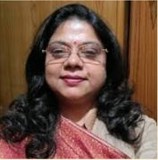
ABSTRACT
Today's New Economic World Order emphasizes raising mass consciousness for holistic development, integrating political, social, economic, and environmental dimensions. Despite progress, material growth alone hasn't ensured happiness. UNESCO's Education for Sustainable Development (ESD) promotes informed, ethical action, yet global inequality persists. India's timeless wisdom - Karma, Reincarnation, Vasudhaiva Kutumbakam - offers pathways to harmony. Reconnecting with our ancient socio-economic and cultural heritage rooted in humanism and wellness is vital to rediscover purpose and build a just, sustainable, and fulfilling life.
Kuruom School of Advanced Sciences, Lucknow, India & Institute of Advanced Sciences (INADS), Dartmouth, MA, USA
Meeting link: https://us02web.zoom.us/j/88180000813?pwd=cnaNQGUEtLvbrIu3V7Lm2i6aJw5kVb.1
Date: (06-04-2025), TIME: 11 AM (IST) / 1:30 AM (EST)
KSAS TALK LECTURE SERIES – ID: 881 8000 0813, Passcode:
130612
Live on: YouTube : @KSASTALK
SPEAKER’S PROFILE
Mr. Nilesh Oak is an adjunct faculty member at the Institute of Advanced Sciences in Dartmouth, Massachusetts, USA. He is also an accomplished author, researcher, and TEDx speaker. Mr. Oak holds a Bachelor's and Master's degree in Chemical Engineering, as well as an Executive MBA. His areas of interest encompass Astronomy, Archaeology, Genetics, Ancient Narratives, and Philosophy. He has published numerous books, including When Did the Mahabharata War Happen, The Historic Rama, and Bhishma Nirvana. His research focuses on dating ancient Indian texts using scientific methods. His works have been translated into several Indian languages. In addition to his writing, Mr. Oak travels extensively around the world, speaking to university and college students..
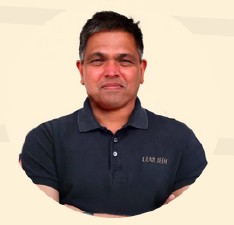
ABSTRACT
Many universities and institutions are committed to research and award PhDs accordingly. However, only a small amount of original and useful research emerges from these efforts. What are some of the reasons for this situation? Is there a solution? This presentation introduces straightforward yet innovative tools for establishing and executing research projects effectively.
Kuruom School of Advanced Sciences, Lucknow, India & Institute of Advanced Sciences (INADS), Dartmouth, MA, USA
Date: (26-03-2025), TIME: 6:30 pm (IST) / 9 am (EST)
KSAS TALK LECTURE SERIES – ID: 811 3784 7624, Passcode:
130612
Live on: YouTube : @KSASTALK
SPEAKER’S PROFILE
Dr. Neeti Sanan-Mishra is the Group Leader at the International Centre for Genetic Engineering and Biotechnology (ICGEB) in New Delhi, India. She has around 30 years of experience in research and teaching. Dr. Neeti leads a dynamic team engaged in groundbreaking research projects on the use of RNAi technology to address pressing climate change-associated challenges in agriculture. She has published numerous research articles and received several awards and patents to her credit.
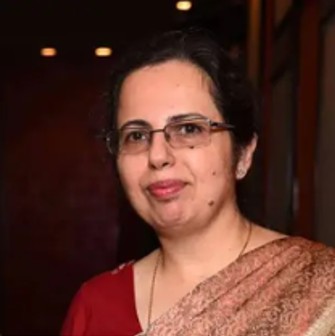
ABSTRACT
The microRNAs (miRNAs) comprise a novel class of regulatory species that have added a new dimension to the genetic management module within living cells. The regulatory action of the miRNAs is typically inhibitory and it may operate at both transcriptional and posttranscriptional levels. The miRNAs are involved in regulating the vital and specialized aspects of plant biology including the growth of cells, the development of organisms, and maintaining the integrity of genomes. The development programming of plants is greatly influenced by a wide range of environmental factors. Among these increasing temperatures, soil salinity and viral infections have emerged as the primary cause of limiting rice production. The stresses are normally multigenic so, it is important to understand the genetic machinery that is activated in response to stress. To explore the role of miRNA networks involved in orchestrating plant development under normal and stressed environments, we adopted the approach of deep sequencing several small RNA libraries of endogenous (indica) rice varieties. During the analysis of sequencing data, we identified several known and novel miRNAs and captured their expression patterns.
Kuruom School of Advanced Sciences, Lucknow, India & Institute of Advanced Sciences (INADS), Dartmouth, MA, USA
Meeting link: https://us02web.zoom.us/j/83402324157?pwd=ZzCzv81Rfve6axOcVjMemDj1MhMvRP.1
Date: (28-02-2025), TIME: 6 PM (IST) / 7:30 AM (EST)
KSAS TALK LECTURE SERIES – ID: 834 0232 4157, Passcode:
130612
Live on: YouTube : @KSASTALK
SPEAKER’S PROFILE
Dr. Zairu Nisha is an Assistant Professor in the Department of Philosophy at Ramanujan College, University of Delhi. She earned her M.Phil. and Ph.D. in Philosophy from Jawaharlal Nehru University. Her teaching interests encompass a range of topics, including Indian Philosophy, Western Philosophy, Continental Philosophy, Feminism, Bioethics, Logic, and the Ethics of Technology. Dr. Nisha's research primarily focuses on Bioethics, Feminism, Motherhood, Continental Philosophy, and Reproductive Technologies.
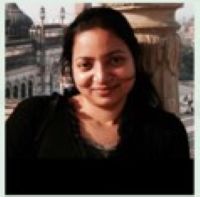
ABSTRACT
Digital technology is affecting and reshaping every aspect of human life, including religion: online sites and media where religious communities are redefining sacredness and transforming spiritual experiences. In this way, virtual spaces and digital tools foster new ways of expressing faith within traditions, broadening how the sacred is communicated technologically. This shift challenges the notion that technology is a universal and practical implication of science and is purely modern and secular, while religion remains traditional. This talk explores how digital innovation reimagines, negotiates, and reshapes religious identities and practices, highlighting the evolving tension and innovation due to the intersection between faith and the digital realm.
Kuruom School of Advanced Sciences, Lucknow, India & Institute of Advanced Sciences (INADS), Dartmouth, MA, USA
Meeting link: https://us02web.zoom.us/j/6977021728? pwd=NlZWQ1p5d3BXQTdKWDhHUC95L3UxZz09&om n=87291098574
Date: (19-02-2025), TIME: 5 PM (IST) / 6:30 AM (EST)
KSAS TALK LECTURE SERIES – ID: 697 702 1728, Passcode:
130612
Live on: YouTube : @KSASTALK
SPEAKER’S PROFILE
Professor Alex Hankey studied Vedic sciences directly under Maharishi Mahesh Yogi in an Upanishadic manner. He developed a unique perspective on the science and philosophy of consciousness, drawing on concepts of critical phenomena and instability from his PhD work, contributing valuable insights across several fields. Hankey has published over 130 articles in peer-reviewed scientific journals and several book chapters. He is recognized on Stanford's list of the top 2% of academics and serves on the editorial boards of six scientific journals, primarily focusing on traditional, complementary, and integrative medicine.
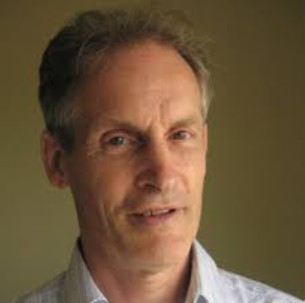
ABSTRACT
Background: Ayurveda is the Upaveda that focuses on biology and medicine. The root word “Ayus” means both "life" and "lifespan." It can also be interpreted as "life force," a holistic concept that was largely set aside by Western biology in the 1930s. However, in recent years, scientific biology has made significant advancements and can now offer a biophysical theory of the life force that aligns with traditional principles. When the life force is strong, it supports health and longevity; when it is weak, the organism becomes vulnerable to disease and even death. This presentation aims to explain how the new scientific understanding of the life force has emerged, how it aligns with traditional principles, and how it relates to the systems approach to understanding Ayurveda.
Methods: The Sandwich Model of Biology, which includes an account of the life force, is applied along with a systems theory approach to examine how the three doshas operate at various levels of organism function.
Results: The Sandwich Model provides the necessary scientific theory for Ayus, while the systems theory demonstrates its relevance not just to individual cells (for which it was developed) but to all levels of the organism: cells, tissues, organs, organ systems, and the whole organism. The life force, or Ayus, coordinates system functions at all levels, and its depletion can lead to dysfunction and ultimately death of the organism.
Kuruom School of Advanced Sciences, Lucknow, India & Institute of Advanced Sciences (INADS), Dartmouth, MA, USA
Meeting link: https://us02web.zoom.us/j/6977021728?pwd=NlZWQ1p5d3BXQTdKWDhHUC95L3UxZz09&omn=857 09155583
Date: (07-02-2025), TIME: 4 PM (IST)
An International Symposium on Consciousness through Science and Philosophy – ID: 697 702 1728, Passcode:
130612
Live on:
SPEAKER’S PROFILE
KSAS Annual Symposium 2025 - February 7-9, 2025
Organizing Committee
The Scientific Committee is composed of:
- Dr. Bal Ram Singh
- Dr. Shipra Dixit
- Dr. Alok Dwivedi
- Dr. Raj Kumar
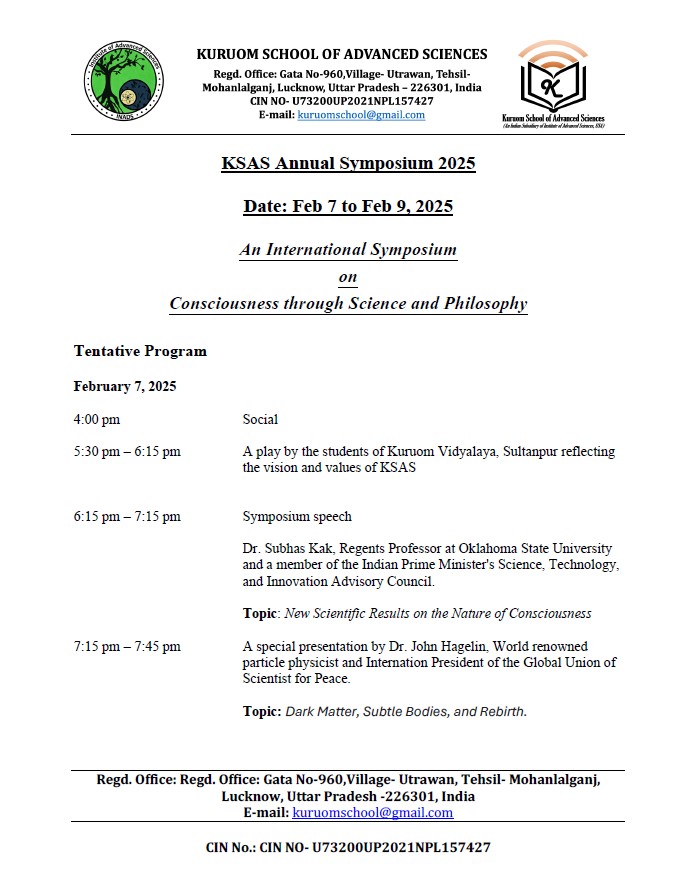
ABSTRACT
Concept Note
The Kuruom School of Advanced Sciences (KSAS) is proud to announce the KSAS Annual Symposium 2025 - a premier event that aims to bring together scholars from both the scientific and philosophical communities to explore the profound and elusive nature of consciousness. This annual gathering serves as a platform for interdisciplinary dialogue, where science and philosophy converge to uncover insights into one of the most profound topics in human inquiry.
Theme Overview
The discussion will focus on consciousness, both in its scientific and philosophical dimensions, aiming to build bridges between the two domains that have historically approached the subject from very different perspectives. Consciousness, an elusive yet fundamental phenomenon, has puzzled both scientists and philosophers for centuries. We seek to explore the concept in its full richness: from the mechanics of consciousness and its role in scientific inquiry to the profound philosophical interpretations of what it means to be conscious.
Objectives
The symposium aims to:
- Promote Interdisciplinary Dialogue - Foster collaboration and mutual understanding between scholars in science and philosophy.
- Explore Different Dimensions of Consciousness - Examine consciousness through both the lenses of science and philosophy.
- Integrate Traditional and Modern Views - Integrate classical philosophical concepts (e.g., Brahman, the self) with modern scientific theories (e.g., quantum consciousness, brain science).
- Advance Holistic Knowledge - Encourage the development of holistic perspectives that unite both analytical (lower knowledge) and intuitive (higher knowledge) forms of inquiry.
Key Themes for Discussion
1. The Nature of Consciousness
- What is consciousness? Is it a fundamental property of the universe, or is it an emergent phenomenon from complex systems like the brain?
- How can we reconcile the subjective experience (qualia) with objective scientific understanding?
2. The Relationship Between Science and Philosophy
- How do the methodologies of science and philosophy compliment one another in the study of consciousness?
- Can consciousness be fully explained through science, or does philosophy provide necessary insights that science cannot uncover?
3. Philosophical Interpretations of Consciousness
- Exploring concepts as Brahman and the self in traditional Eastern philosophy and how they relate to Western philosophical perspectives on consciousness (e.g., Descartes, Kant, and contemporary phenomenology).
- The idea of unified knowledge (higher knowledge) versus segregated knowledge (lower knowledge) and how they pertain to our understanding of consciousness.
4. Scientific Approaches to Consciousness
- Investing neuroscience, quantum mechanics, and emergent systems theory to understand consciousness.
- The controversial and exciting topic of whether consciousness can be quantized, and the implications of quantum theories of consciousness.
5. Consciousness in Non-Human Entities
- Understanding consciousness in plants, animals, and artificial systems.
- Is consciousness a uniquely human trait, or do other beings experience forms of consciousness?
Sponsorship and Collaboration
KSAS is pleased to host this event with support from the Institute of Advanced Sciences (INADS), USA. We welcome suggestions and invitations for collaboration, sponsorship, or funding to enhance the impact and reach of this important gathering.
Kuruom School of Advanced Sciences, Lucknow, India & Institute of Advanced Sciences (INADS), Dartmouth, MA, USA
Meeting link: https://us02web.zoom.us/j/82720378286?pwd=YXXm4IOapJ0eGmfO9cGt3j82VCX8uG.1
Date: (19-12-2024), TIME: 5 PM (IST) / 6:30 AM (EST)
KSAS TALK LECTURE SERIES – ID: 827 2037 8286, Passcode:
130612
Live on: YouTube : @KSASTALK
SPEAKER’S PROFILE
Dr. Shashi Tiwari - Former Professor, Maitreyi College, the University of Delhi Visiting Professor at the Hindu University of America, Orlando, USA, and recipient of the Rashtrapati Samman
Professor Madan Mohan Goel - Propounder Global Centre for Needonomics, Kurukshetra Vice Chancellor Starex University, Jagannath, Jaipur & RGNIYD (Government of India), and Pro Vice-Chancellor at VKSU (State University of Bihar)
Dr. R.P. Singh - Former Professor, School of Social Sciences, Centre for Philosophy, and Dean, Faculty of Humanities & Religious Studies at Guru Nanak Dev University, Amritsar
Session Chair: Professor Bal Ram Singh - Former Professor, University of Massachusetts Dartmouth, President & Professor, Institute of Advanced Sciences, USA, and President of Prime Bio Inc.
Moderator: Dr. Alok Kumar Dwivedi
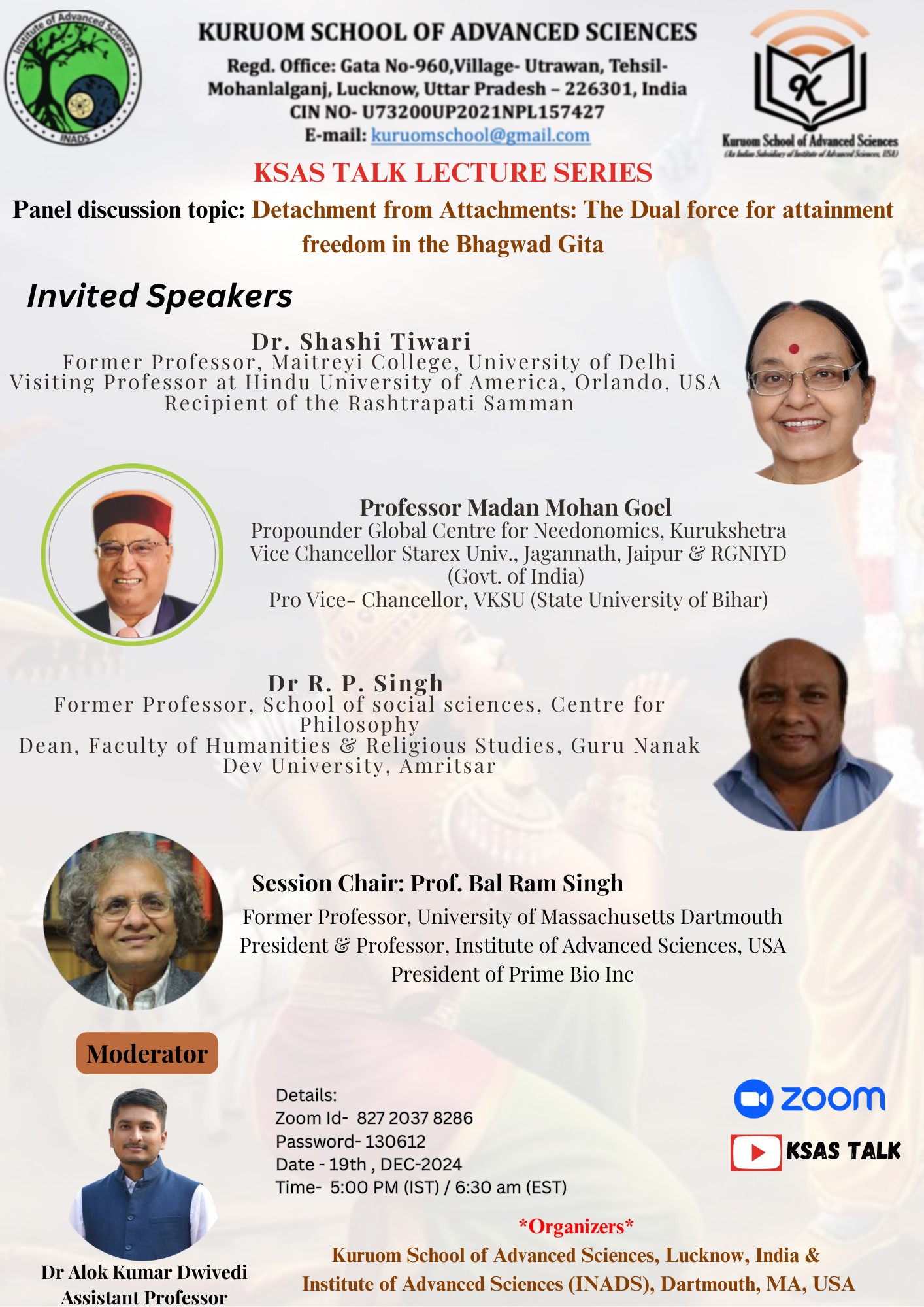
ABSTRACT
The Bhagavad Gita, one of the most revered texts that offers wisdom to address many practical issues such as spirituality and the human mind, provides guidance on developing one's life and navigating through life's trials and tribulations. One of its core teachings is the concept of detachment (Vairagya) which is closely linked to Sanyasa (renunciation) to attain the ultimate goal of life (detachment from attachments leading to liberation). In today's world, where stress, emotional turmoil, and attachment to material outcomes are rampant, the premise of this panel discussion is very relevant.
This panel discussion will explore the philosophical, psychological, and practical dimensions of detachment, offering insights for gaining personal wisdom to navigate through the challenges of today's life. The discussion will also deal with the meaning of freedom unfulfilling one's responsibilities while avoiding the emotional conflicts in performing those responsibilities. This discussion will strive to create an enhanced understanding of the Bhagavad Gita's teachings on detachment and freedom.
Objectives
- To explore the meaning and significance of detachment as presented in the Bhagavad Gita.
Key discussion points:
- How does the Gita define detachment in the context of selfless action?
- How does detachment help in realizing the importance of selfless attachment?
2. To examine the relationship between detachment and freedom in achieving inner peace.
Key discussion points:
- How does detachment contribute to the freedom of the mind and soul?
- What is the connection between freedom from attachment and inner peace?
- How can one achieve emotional freedom through detachment?
3. To provide a modern interpretation of the teachings for practical application in daily life.
Key discussion points:
- How can one practice detachment without losing their sense of engagement or responsibilities in the world?
- What is the path one should define to attain this?
Kuruom School of Advanced Sciences, Lucknow, India & Institute of Advanced Sciences (INADS), Dartmouth, MA, USA
Meeting link: https://us02web.zoom.us/j/84087903462? pwd=v9HczLKrNhKZmFq9YbdD5w9GaUxmta.1
Date: (21-11-2024), TIME: 6 PM (IST) / 7:30 AM (EST)
KSAS TALK LECTURE SERIES – ID: 838 6101 5505, Passcode:
593084
Live on: YouTube : @KSASTALK
SPEAKER’S PROFILE
Dr. John A. Bogdan, Jr. received his B.S. in Biology from Rensselaer Polytechnic Institute. He received an M.A. and Ph.D. in Microbiology and Immunology from SUNY at Buffalo Jacob's School of Medicine and Biomedical Sciences. From there, he performed a post-doctoral fellowship at the Dupont Merck Pharmaceutical Company. After his postdoc, he became a Research Scientist at Wyeth Lederle Vaccines and Pediatrics and a Senior Research Scientist at North American Vaccines, Inc. and Baxter Biosciences. Dr. Bogdan, Jr. has spent over a dozen years working at the National Institute of Allergy and Infectious Diseases (NIAID) as a Scientific Review Officer and Program Officer. He started his own consulting company, Valaria Technical Consultants, LLC, and has been successful in enabling awards for US funding to companies for the development of vaccine and therapeutics platform technologies. During his career, he has assisted in the advancement and licensing of three vaccines, including one therapeutic and another in advanced development for licensure.
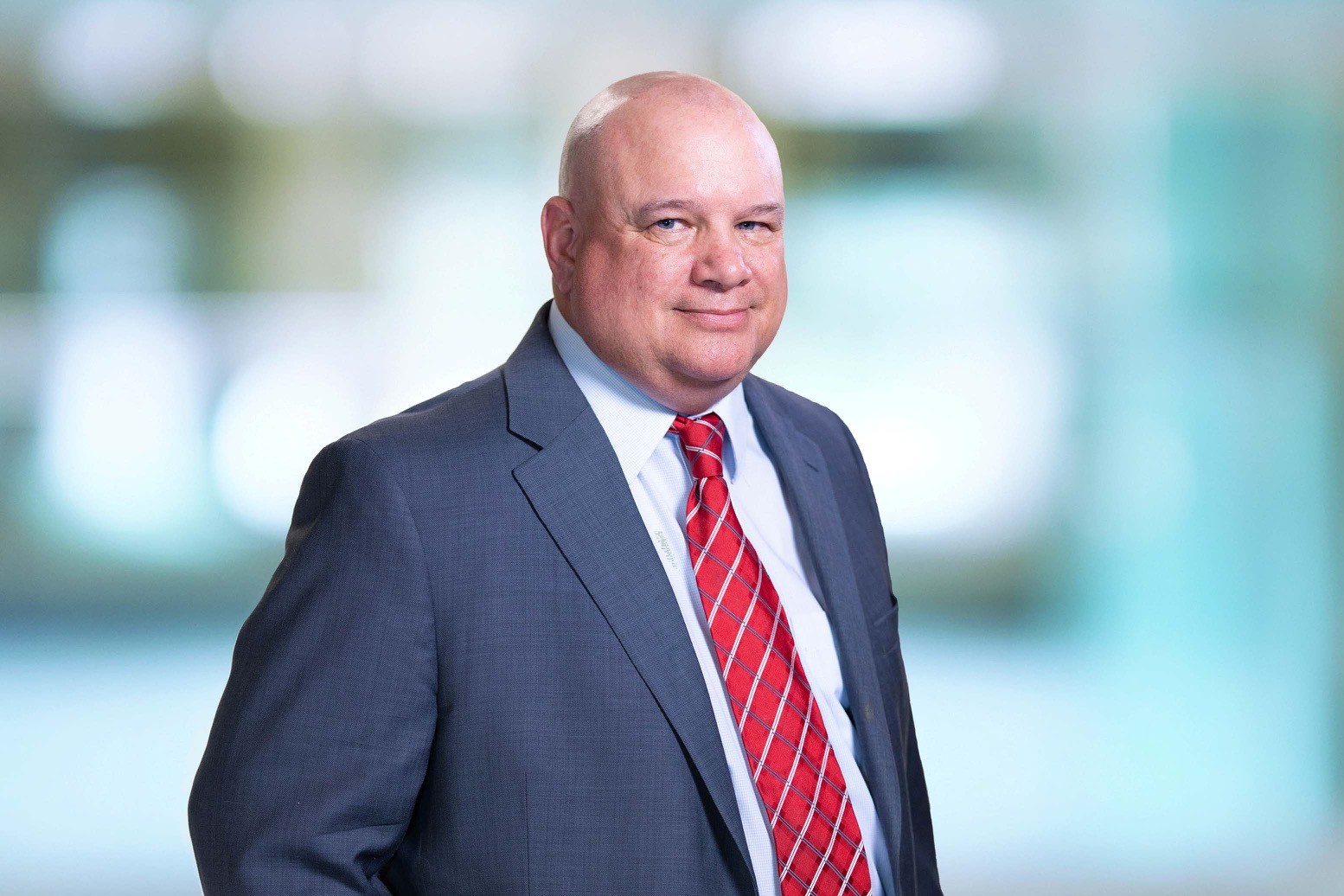
ABSTRACT
Meningococcal disease is an acute, severe illness caused by the bacterium Neisseria meningitidis. N. meningitidis is a leading cause of bacterial meningitis that can also cause pneumonia and focal diseases, such as septic arthritis in adults and loss of hearing in children. Five meningococcal vaccines are licensed and available in the United States: three quadrivalent (serogroups A, C, W, and Y) conjugate meningococcal vaccines and two recombinant serogroup B vaccines. N. meningitidis, or meningococcus, is an aerobic, gram-negative bacterium. The outer membrane of N. meningitidis is surrounded by a polysaccharide capsule that is important for pathogenicity because it helps the bacterium resist phagocytosis and complement-mediated lysis. Almost all reported cases of invasive disease worldwide are caused by one of six serogroups: A, B, C, W, X, and Y. Meningococci are transmitted person-to-person by respiratory droplets or secretions from persons who either are asymptomatic carriers of the disease or have meningococcal disease. The bacteria colonizes the mucosal cells of the nasopharynx and oropharynx and, in a small proportion (much less than 1%) of persons, penetrates the mucosal cells and enters the bloodstream.
Kuruom School of Advanced Sciences, Lucknow, India & Institute of Advanced Sciences (INADS), Dartmouth, MA, USA
Meeting link: https://us02web.zoom.us/j/84087903462? pwd=v9HczLKrNhKZmFq9YbdD5w9GaUxmta.1
Date: (07-11-2024), TIME: 7 PM (IST) / 9:30 AM (EST)
KSAS TALK LECTURE SERIES – ID: 840 8790 3462, Passcode:
852126
Live on: YouTube : @KSASTALK
SPEAKER’S PROFILE
Dr. Shuowei Cai is a Professor of Chemistry and Biochemistry at the University of Massachusetts Dartmouth. He earned his Bachelor of Science degree in Chemistry and a Master of Science degree in Analytical Chemistry from Nankai University. He also obtained a Master of Science in Biochemistry from the University of Massachusetts Dartmouth and a Ph.D. in Biological Chemistry from the University of Massachusetts Amherst, where he studied under Professor Bal Ram Singh. Dr. Cai has over 27 years of experience working on the botulinum neurotoxin and has published more than 65 papers in peer-reviewed journals. His research interests include Biophysical and Bioanalytical Chemistry, Protein Chemistry, and Pharmaceutical Biotechnology.
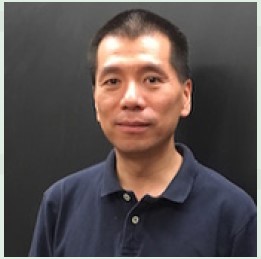
ABSTRACT
Life began with microorganisms. They adapted rapidly to diverse environments, leading to an incredible diversity of microbial species, and crucial to our planet's ecosystems, including human health. More than 39 trillion microbes are in the human body (more than our own cells), and they play an important role in our health. Microorganisms have been on our planet for billions of years and have evolved to adapt to the environment. Mutation is the engine of evolution. Gene insertion/deletion and horizontal gene transfer also increase the gene repertoire. Clostridium botulinum is an anaerobic, gram-positive, spore-forming bacilli, which have been on the planet for billions of years (among the earliest life forms on Earth). We will present the evolution of C. botulism using molecular tools. We will also discuss how scientists learned from microbial evolution to develop new tools for synthetic biology.
Kuruom School of Advanced Sciences, Lucknow, India & Institute of Advanced Sciences (INADS), Dartmouth, MA, USA
Meeting link: https://us02web.zoom.us/j/84158944727?pwd=PEzzmloaz6ObO4UYe3L4gbX3uewLwh.1
Date: (22-10-2024), TIME: 4 PM (IST)
KSAS TALK LECTURE SERIES – ID: 841 5894 4727, Passcode:
721031
Live on: YouTube : @KSASTALK
SPEAKER’S PROFILE
Prof. (Dr.) K G Suresh is a Senior Journalist, Educationalist, Institution Builder, Socio-Political Commentator & Communication Strategist. He is also the Founder and President of the Global Media Education Council, the only India-driven international academic platform & Vice President, of the Indian Communication Congress. Earlier, he had served as Vice Chancellor, of Makhanlal Chaturvedi National University of Journalism & Communication, Bhopal, Director General, of the Indian Institute of Mass Communication, Senior Consulting Editor with Doordarshan News, India's public news broadcaster, Founder Dean, School of Modern Media, Univerzity of Petroleum & Energy Studies (UPES), Dehradun. He is a recipient of the prestigious Ganesh Shankar Vidyarthi Award for outstanding contribution to Journalism by the Kendriya Hindi Sansthan, Ministry of Education. He was earlier designated Commonwealth Youth Ambassador for Peace by the Commonwealth Youth Programme, Asia.
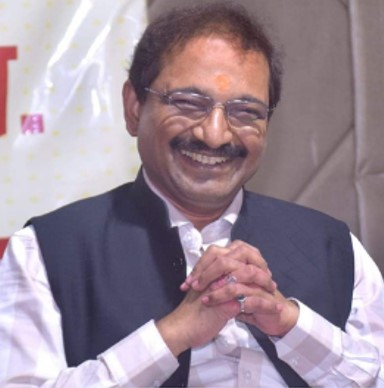
ABSTRACT
The National Media Literacy Mission is crucial in today's information-rich environment, where misinformation can easily spread. By promoting critical thinking and analytical skills, this initiative empowers individuals to evaluate sources and discern credible information from falsehoods. It fosters informed citizenship and encourages responsible media consumption, essential for a healthy democracy. As digital platforms continue to evolve, enhancing media literacy is vital for protecting societal values, promoting public discourse, and ensuring that citizens can navigate the complexities of modern communication effectively.
Kuruom School of Advanced Sciences, Lucknow, India & Institute of Advanced Sciences (INADS), Dartmouth, MA, USA
Meeting link: http://us02web.zoom.us/j/81474901799?pwd=JvuoXeVWbKSnpCOnKTDg74QMbjSy6a.1
Date: (30-08-2024), TIME: 5 PM (IST)
KSAS TALK LECTURE SERIES – ID: 814 7490 1799, Passcode:
382661
Live on: YouTube : @KSASTALK
SPEAKER’S PROFILE
Dr. U. V. Kiran, Professor and Dean at Babasaheb Bhimrao Ambedkar University, Lucknow, is a distinguished academic with 19+ years of experience. A topper and gold medalist, she holds a Ph.D. in Ergonomics. She has over 100 publications, a patent, and a copyright. Her expertise spans Ergonomics, occupational health, and societal issues. An active member of prestigious professional bodies, she has received multiple awards and contributes significantly to scholarly research and discourse.
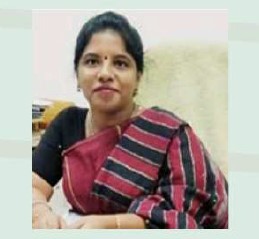
ABSTRACT
Biomedical waste, including used needles, blood-soaked bandages, expired medications, and chemical reagents, originates from healthcare facilities, research labs, and households. Improper disposal poses global risks, contaminating soil and water, and leading to significant impacts on ecosystems and biodiversity. Effects include chemical contamination, disease spread, bioaccumulation, genetic and reproductive damage, habitat destruction, and long-term ecological changes, potentially destabilizing ecosystems. To mitigate these threats, strict regulations, green practices, and public education on biomedical waste management are essential. Promoting responsible handling and disposal is crucial for safeguarding biodiversity and preventing environmental pollution, especially in aquatic ecosystems.
Kuruom School of Advanced Sciences, Lucknow, India & Institute of Advanced Sciences (INADS), Dartmouth, MA, USA
Meeting link: https://us02web.zoom.us/j/82332752965?pwd=janAzhlpYaColc9sm31TxAkc2BWNW2.1
Date: (19-07-2024), TIME: 6 PM (IST) / 7:30 AM (EST)
KSAS TALK LECTURE SERIES – ID: 823 3275 2965, Passcode:
719953
Live on: YouTube : @KSASTALK
SPEAKER’S PROFILE
From the Propounder Needonomics School of Thought, Dr. Madan Mohan Goel is a three-time Vice Chancellor and superannuated Professor of Economics from Kurukshetra University. He has 46 years of teaching and 17 years of administrative experience. He served as the ICCR Chair Professor in South Korea, Advisor to the 6th State Finance Commission Haryana, and NAAC Assessor. Dr. Goel has international recognition, numerous awards, and extensive publication credits, including 524 publications and guiding 50 scholars. He is honored for his contributions to Needonomics and higher education. As a spiritual citizen, he has written 412 blogs and drafted the IPR Policy of KUK.
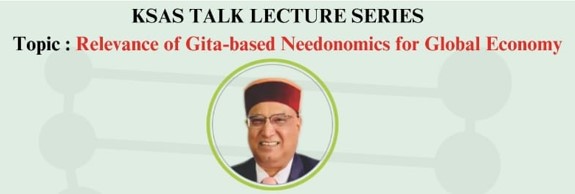
ABSTRACT
In a world facing recurring economic crises, Needonomics - rooted in the Bhagavad Gita's principles - promotes a sustainable and ethical economic model. Contrasting with Greedonomics, Needonomics aligns economic activities with basic human needs and ethical practices, emphasizing non-violence and environmental care. It advocates for judicious resource use, inter-generational equality, and spiritually guided materialism (SGM). By embracing the NAW approach (Need, Affordability, and Worth), and fostering altruism, Needonomics aims to reduce global issues like violence and corruption. This model urges stakeholders, including politicians and global citizens, to adopt a people-friendly, sustainable economy inspired by spiritual teachings.
Kuruom School of Advanced Sciences, Lucknow, India & Institute of Advanced Sciences (INADS), Dartmouth, MA, USA
Meeting link: https://us02web.zoom.us/j/86700198505?pwd=InKmmTS3Nga8J8oAq6H4kaeuM4bpGy.1
Date: (26-06-2024), TIME: 6 PM (IST) / 7:30 AM (EST)
KSAS TALK LECTURE SERIES – ID: 867 0019 8505, Passcode:
510157
Live on: YouTube : @KSASTALK
SPEAKER’S PROFILE
Dr. Shyam Narayan Pandey is an Assistant Professor in the Department of Political Science at Motilal Nehru College (Evening), University of Delhi. With over five years of teaching experience across various colleges of Delhi University, he specializes in Indian Government and Politics, Western Political Thought, Indian Political Thought, and Political Theory. Dr. Pandey completed his PhD on the Ambedkarite movement in Uttar Pradesh. He has presented around a dozen research papers at national and international seminars, with eight published in reputed research journals. Additionally, he has a strong understanding of national and border security issues.
Dr. Jitendra Kumar is an Assistant Professor in the Department of Political Science at the University of Lucknow, Lucknow. He earned his PhD from Allahabad University, specializing in electoral reforms in Indian politics post-1990. In addition to his academic responsibilities, Dr. Kumar serves as an Assistant Proctor at the University of Lucknow. He has published several research papers in reputed journals, contributing significantly to the field of political science.
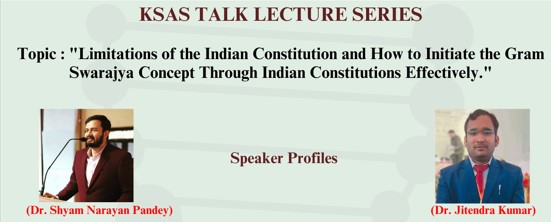
ABSTRACT
This session aims to explore the concept of Gram Swaraj, tracing its Gandhian roots, historical significance in India's independence movement, and its modern-day relevance for rural development and local self-governance. Key discussion points include constitutional provisions supporting Gram Swaraj, with a focus on Panchayati Raj Institutions and the 73rd Amendment Act, 1992. The session will address challenges in judiciary and government effectiveness and issues related to Fundamental Rights and Directive Principles. Additionally, it will offer policy recommendations, highlight the role of civil society, NGOs, and local communities, and propose strategies for better intergovernmental coordination to enhance grassroots democracy.
Kuruom School of Advanced Sciences, Lucknow, India & Institute of Advanced Sciences (INADS), Dartmouth, MA, USA
Meeting link: https://www.youtube.com/live/_MmNvTqTNCM?si=3y2YP-DoRA8A_lmd
Date: (15-05-2024), TIME: 5 PM (IST)
KSAS TALK LECTURE SERIES – ID: 697 702 1728, Passcode:
130612
Live on: YouTube : @KSASTALK
SPEAKER’S PROFILE
Swati Dave is an educator and a project management consultant with over 30 years of experience in the fields of civil engineering, education, e-learning, and training. She is the Founder and CEO of The Institute for the Advancement of Vedic Mathematics, a global charitable organization registered in the UK. She will talk on Mathematical Practices in Tinnai Schools in Tamil Nadu (South India)
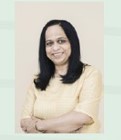
ABSTRACT
Prior to the imposition of British colonial school structures, traditional institutions of elementary-level learning existed across India, in both urban and rural areas. In Tamil Nadu, South India, the local schools were called - Tinnai schools. In this talk the speaker seeks to draw out the structural and curricular practices of Tinnai schools, specifically focusing on the teaching and learning of mathematics, and also discuss the relevance to the current education system.
Kuruom School of Advanced Sciences, Lucknow, India & Institute of Advanced Sciences (INADS), Dartmouth, MA, USA
Meeting link: https://us02web.zoom.us/j/6977021728? pwd=NlZWQ1p5d3BXQTdKWDhHUC95L3UxZz09&omn=823620 50098
Date: (27-04-2024), TIME: 5 PM (IST)
Zoom Link – ID: 6977021728, Passcode:
130612
Live on: YouTube : @KSASTALK
SPEAKER’S PROFILE
Jonas Funer is a pioneering figure in biomedical research. With a bachelor's degree in Laboratory Animal Technology and postgraduate studies in Business Administration, he's helmed preclinics Gesellschaft für praklinische Forschung mbH as CEO since 2006. Funer's leadership spans roles like Head of Preclinical Research in Berlin and CEO of BCD biomedical consulting. His expertise ranges from hands-on research, contract research, development of gene transfer models, and neuroimaging. He has several publications and patents including measuring mouse activity to therapeutic botulinum neurotoxins, underscoring his commitment to innovative solutions in healthcare. Overall, Funer's career embodies a fusion of scientific acumen, entrepreneurial spirit, and leadership in advancing preclinical science.
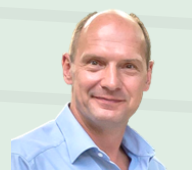
ABSTRACT
Antibody-based drugs are an enormous growing market. In this talk, it is described how antibodies are developed. Starting with the different strategies to create antibodies and describing the process of antibody development, including the preclinical testing of antibodies.
Kuruom School of Advanced Sciences, Lucknow, India & Institute of Advanced Sciences (INADS), Dartmouth, MA, USA
Meeting link: https://us02web.zoom.us/j/6977021728?pwd=NlZWQ1p5d3BXQTdKWDhHUC95L3UxZz09&omn=84537982168
Date: (18-04-2024), TIME: 5 Pm (IST)
Zoom Link – ID: 697 702 1728, Passcode:
130612
Live on: YouTube : @KSASTALK
SPEAKER’S PROFILE
Professor Pawan K. Dhar is currently Head of the Synthetic Biology group at the School of Biotechnology, Jawaharlal Nehru University, New Delhi. In 1993, he received a Ph.D. degree from BHU (Varanasi) in Human Genetics. One of his significant contributions has been developing a novel drug discovery platform from DNA sequences historically considered junk. In the past, he has established research labs in India, Singapore, and Japan; and published in the areas of Human Genetics, Systems Biology, and Synthetic Biology, covering computational, experimental, and policy areas.
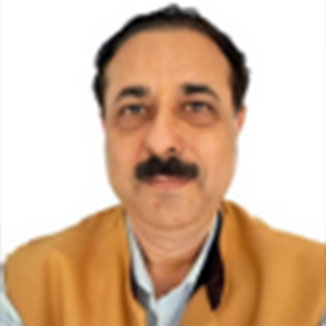
ABSTRACT
From the functional standpoint, broadly, three kinds of functional DNA sequences exist - one that encodes proteins, the second that encodes only RNA (non-coding DNA), and the third that does not transcribe at all (NOT coding DNA). Historically, people have paid attention to protein-coding genes. For the last two and a half decades, non-coding RNA has taken center stage in biology. However, the role of non-expressing DNA (the dark matter of the genome) is still a relatively less traveled path. We asked a simple question: How did nature decide to allocate protein-coding and RNA-coding jobs to a specific set of sequences? Given the enormous information available in the neighborhood, did she sample all possibilities, retaining good results (protein and RNA-encoding genes), retiring not-so-relevant results (pseudogenes), and leaving some genome sequences untouched (non-expressing genome)? We developed a novel approach for designing lab-made genes to answer the critical question and showed their expression and phenotypic outcomes. To bring in a rational design approach, we initiated a project to build a knowledgebase that predicts the result of making user-defined genes from intergenic sequences. In my talk, I will describe the concept behind the Dark Genome project, computational and experimental evidence, and the future roadmap.
Kuruom School of Advanced Sciences, Lucknow, India & Institute of Advanced Sciences (INADS), Dartmouth, MA, USA
Meeting link: Meeting Link
Date: (28-02-2024), TIME: 6 PM (IST)
Zoom Link – ID: 899 1824 4013, Passcode:
426258
Live on: Youtube: @KSASTALK
SPEAKER’S PROFILE
Klaus Fink, MD, embarked on his medical journey at Giessen University, Germany, focusing on Internal Medicine for his MD thesis. He honed his expertise in neuropharmacological research at Essen and Bonn University Medical Centre, obtaining board certification in Pharmacology and Toxicology. At Harvard Medical School, he delved into apoptotic cell death in stroke and neurodegenerative disorders. Later, as Professor of Pharmacology and Toxicology at Bonn University, he contributed to drug registrations for neurology and psychiatry. Joining Merz Pharmaceuticals in 2008, he leads Neurotoxin and Biotechnology Development, advancing new formulations and clinical indications. With over 150 publications and memberships in scientific societies, Fink is a respected figure in neuroscience.
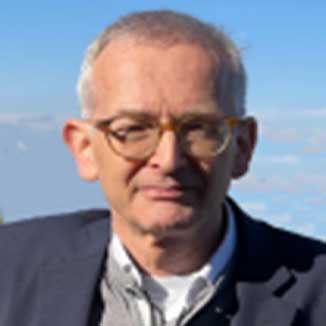
ABSTRACT
In the 20th century, pharmacotherapies relied heavily on small molecules, versatile in treating various diseases including pain, cardiovascular diseases, infections, mental disorders, cancer, and diabetes. However, the advent of biologics, starting with Emil von Bering's therapeutic antibody against diphtheria in 1890 and insulin from pig pancreas in 1922, marked a significant shift. By 1980, recombinant human insulin paved the way for a surge in recombinant protein therapeutics. Presently, biologics constitute over 50% of new therapeutic entities, with more than 75 monoclonal antibodies and 150 biologics approved by the FDA. This shift is attributed to their exceptional specificity, notably in monoclonal antibodies, resulting in fewer side effects. Unlike small molecules, biologics have distinct pharmacokinetics, utilizing convective transport or transcytosis for absorption, lymphatic and blood circulation for distribution, and receptor-mediated or lymph node phagocytosis for elimination. This abstract will explore these processes using monoclonal antibodies and botulinum neurotoxin, both having a molecular weight of 150 kDa, as examples.
426258
Date: (30-11-2023), TIME: 5 pm / 6:30 am (EST)
Zoom Link – ID: 8416 706 1814, Passcode:
250856
Live on:
SPEAKER’S PROFILE
Yashwant Pathak completed his Ph.D. in Pharmaceutical Technology from India and EMBA and MS in Conflict Management from Sullivan University, USA. He is the Associate Dean for the Faculty Affairs College of Pharmacy, University of South Florida in Tampa, Florida. With extensive experience in academia and industry, he has over 150 research publications, abstracts, chapters, and reviews, seven books on Nanotechnology and Drug Delivery Systems, six on Nutraceuticals, and several books on Cultural Studies. His areas of research include drug delivery systems, Nanotechnology applications for pharmaceuticals, and Nutraceuticals. He has traveled extensively to over 80 countries to network with scientific experts and is actively involved with many pharmacy colleges in different countries.
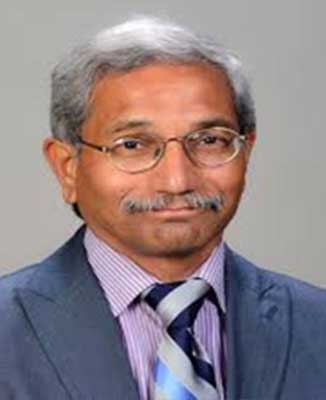
ABSTRACT
The world 2,000 years ago had several traditions and cultures such as over 500 nations of native Americans on the American continent, over 1,000 cultures of Africans, Australian Aboriginals, New Zealand Maoris, and so on. In Europe, there are many cultures known as Pagan. All these cultures have several commonalities such as the concept of God, human relationship with God, strong families, the concept of rebirth, and so on. This talk will cover the commonalities in the cultures and challenges these are facing around the world.
Kuruom School of Advanced Sciences, Lucknow, India & Institute of Advanced Sciences (INADS), Dartmouth, MA, USA
Date: (27-10-2023), TIME: 6 PM IST
Zoom Link – ID: 8853 985 9279, Passcode:
594260
Live on: Facebook & Youtube: @KSASTALK
SPEAKER’S PROFILE
Dr. Saurabh Yadav is the Assistant Professor Department of Biotechnology School of Life Sciences at the H.N.B. Garhwal University (A Central University) Srinagar, Garhwal 246 174 Uttarakhand, India.
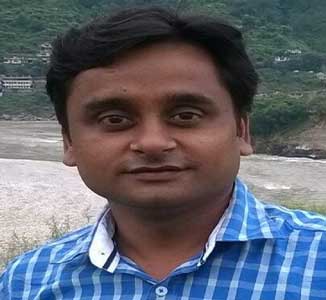
ABSTRACT
In today's rapidly evolving landscape of science and technology, profound growth and advancements are increasingly viewed through the prism of commerce and the economy. The catalysts behind these innovative endeavors are often a careful blend of time and financial investments, and they necessitate protection through intellectual property laws. To shield their creations, inventors and creators can rely on a variety of Intellectual Property Rights (IPR) instruments, including patents, copyrights, geographical indications, trademarks, and trade secrets. Looking ahead, it is clear that soon, IPR will play an instrumental role in propelling the expansion of the global economy, especially in the realm of knowledge-based inventions.
Kuruom School of Advanced Sciences, Lucknow, India & Institute of Advanced Sciences (INADS), Dartmouth, MA, USA
Date: (27-09-2023), TIME: 6 pm (IST)
Zoom Link – ID: 8853 985 9279, Passcode:
594260
Live on: Facebook & Youtube: @KSASTALK
SPEAKER’S PROFILE
Dr. Purushottama Bilimoria is Principal Fellow at the University of Melbourne a Visiting Teacher Professor at the University of California (Merced and Berkeley), and San Francisco State University. He has also taught at Emory University, Columbia University, and Stony Brook University, as well as being an Honorary Professor at Deakin University of Melbourne. He is an Editor-in-Chief of Sophia (International Journal of Philosophy & Tradition with Springer, and Sophia Series in Cross-Cultural Philosophy & Cultures). He works in Indian & Cross-Cultural Philosophy, Critical Philosophies of Religion, Classical Indian and Personal Law, and Diaspora Studies. His recent publications include Routledge History of Indian Philosophy (with A. Rayner, 2019); Contemplative Studies and Hinduism (with Rita D. Sherma, C. Bohenac, 2021); Routledge Handbook of Indian Ethics; Gender Justice Bioethics & Ecology (with A. Rayner, 2023); and Engaging Philosophies of Religion (with G. Kopf & N. Loewen, 2024).
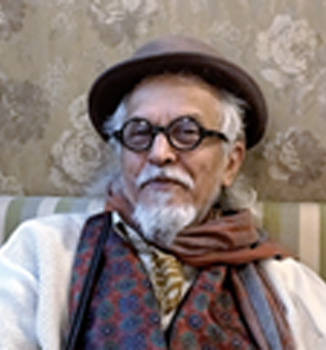
ABSTRACT
Dr. Bilimoria is a very well-known philosopher and expert in the field of emotions in Indian Philosophy. Emotions are always treated as judgemental values. Traditional Western approaches consist of mind-body bifurcation, self, and ethical & moral values/norms. He challenges traditional Western approaches to understanding intense emotions like grief and loss. His theories critique the focus on judgment and propositions in Western emotion studies, proposing a shift to cross-cultural perspectives centered on "reciprocity" rather than Kantian duty or virtue ethics. In addition, he explores alternatives to binary thinking and turns to Psychoanalysis and Indian Phenomenology for a more nuanced understanding of complex emotions, emphasizing a departure from conventional Western paradigms.
Kuruom School of Advanced Sciences, Lucknow, India & Institute of Advanced Sciences (INADS), Dartmouth, MA, USA
Date: (25-08-2023), TIME: 5 PM (IST) / 6:30 AM (EST)
Zoom Link – ID: 8853 985 9279, Passcode:
594260
Live on: Facebook & Youtube: @KSASTALK
SPEAKER’S PROFILE
Dr. John A. Bogdan, Jr. received a B.S. in Biology from Rensselaer Polytechnic Institute and an M.A. and Ph.D. in Microbiology and Immunology from SUNY at Buffalo Jacob’s School of Medicine and Biomedical Sciences. From there, he went on to perform a post-doctoral fellowship at the Dupont Merck Pharmaceutical Company. After his post-doc, he became a Research Scientist at Wyeth-Lederle Vaccines and Pediatrics and then a Senior Research Scientist at North American Vaccines, Inc. and Baxter Biosciences. He spent over a dozen years working at the National Institute of Allergy and Infectious Diseases (NIAID) as a Scientific Review Officer and Program Officer before starting his own consulting company, Valaria Technical Consultants, LLC which was successful in enabling awards for US funding to companies for development of vaccine and therapeutic platform technologies. During his career, he has assisted in the advancement and licensing of three vaccines, one therapeutic and another in advanced development for licensure. He has managed programs that have completed many phase I/II clinical studies.
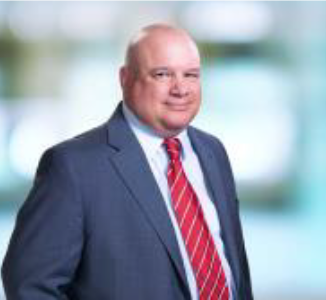
ABSTRACT
Almost 50 years after the discovery of monoclonal antibodies (mAbs), mAbs have now fulfilled the original promise of revolutionizing medicine. There are over 100 approved mAbs by the FDA and the number is growing rapidly. This presentation will explore the discovery and evolution of the field of mAb drug development and include aspects of basic structure and function, manufacturing processes, formulation, Pharmacology (PK), and Toxicology. The FDA licensing process will be described with emphasis on developing under the guidance of the FDA Animal Rule where clinical trials are unable to be performed to test their efficacy in humans. Finally, the future of the field and potential new uses will be examined. The presentation should help attendees gain a better understanding of the field of mAb product development.
Kuruom School of Advanced Sciences, Lucknow, India & Institute of Advanced Sciences (INADS), Dartmouth, MA, USA
Date: (26-07-2023), TIME: 5 PM (IST) / 6:30 AM (EST)
Zoom Link – ID: 885 3985 9279, Passcode:
Y1ZJQndDRHRxOU10d1UvLOkSOUEVdz09
Live on: Facebook & Youtube: @KSASTALK
SPEAKER’S PROFILE
Professor J. S. Dubey is a known figure in the field of Theology, Logic, and Advaita Vedanta. He has published several books and research papers in this area. Currently, he is working as a Professor of Philosophy at Government Hamidia Arts and Commerce College, Bhopal. He is also a Visiting Professor at Sanchi University and holds the post of General Secretary of All India Philosophy Association. Professor Dubey has an interest in writing Gazal and Poems.
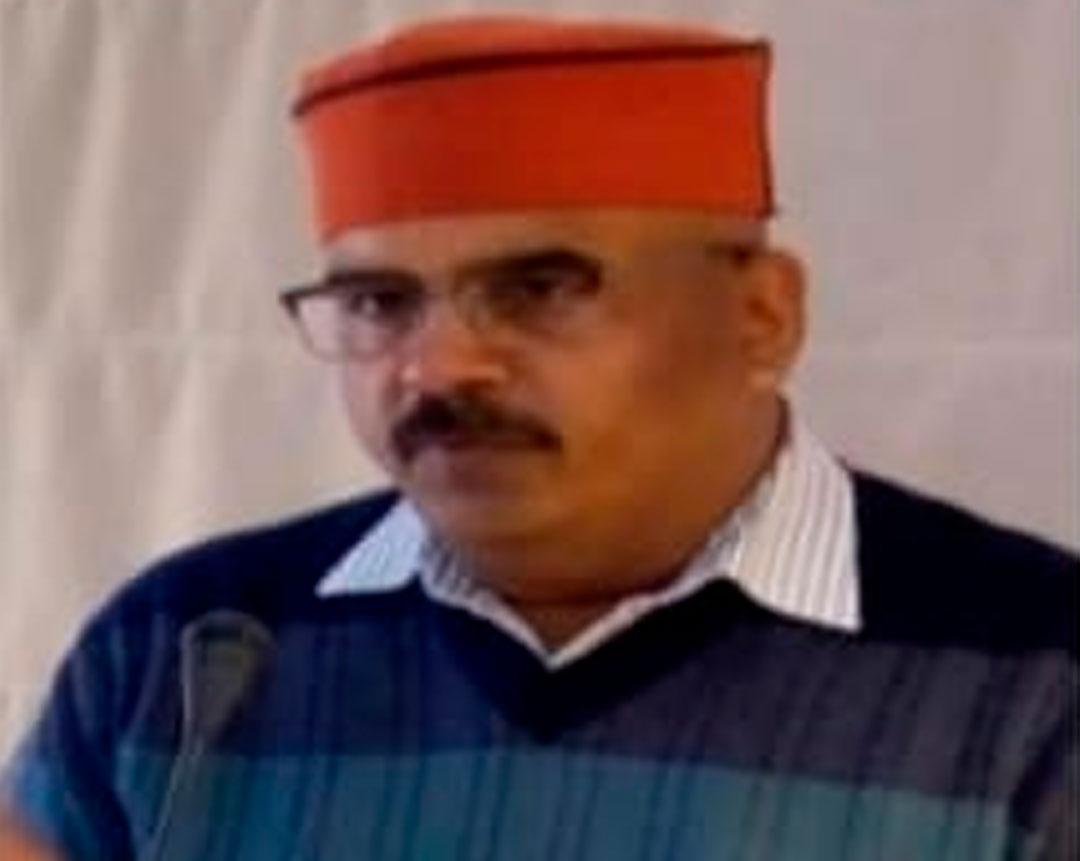
ABSTRACT
Duality is a notion of the material world whereas non-duality represents spirituality. As we move upward in life, we have to be non-dual (Advait) with the spirit to achieve the peak position in that area. Yog is a tool to move from dual to non-dual. Evolution could be either positive or negative or a mixture of both, however, concepts of Prakriti and Purusha will create oneness. In the duality concept, both terms behave at different levels, whereas, in the non-duality concept, both are at the same level, as in the intermingled state. Not only do we need to understand this aspect of philosophy but we need to practice the non-dualistic pursuits in our life.
Kuruom School of Advanced Sciences, Lucknow, India & Institute of Advanced Sciences (INADS), Dartmouth, MA, USA
Date: (21-06-2023), TIME: 5 PM (IST) / 7:30 AM (EST)
Zoom Link – ID: 822 7389 5842, Passcode:
709571
Live on: Facebook & Youtube: @KSASTALK
SPEAKER’S PROFILE
Dr. Bharatendra Rai is a Professor of Business Analytics at the Charlton College of Business at UMass Dartmouth, USA. He is also the Department Chair of Decision and Information Science. He received a Ph.D. in Industrial Engineering from Wayne State University, Detroit, Michigan, USA. He earned two Master's degrees including specializations in quality, reliability, and OR from Indian Statistical Institute in India. His current research interests include Machine Learning and Deep Learning Applications. His YouTube channel is watched in over 225 countries.
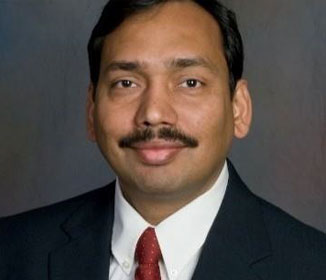
ABSTRACT
Deep learning is a branch of machine learning based on a set of algorithms that attempt to model high-level abstractions in data. Since it performs quite well in several diverse problems, Deep Learning is quickly becoming the algorithm of choice for the highest predictive accuracy. In this keynote, Machine Learning and Deep Learning Applications with structured and unstructured data are shared along with discussions on recent trends, research, and job opportunities.
Kuruom School of Advanced Sciences, Lucknow, India & Institute of Advanced Sciences (INADS), Dartmouth, MA, USA
Date: (24-05-2023), TIME: 5 Pm (IST)/ 7:30 am (EST)
Zoom Link – ID: 851 3778 7836, Passcode:
351965
Live on: Facebook & Youtube: @KSASTALK
SPEAKER’S PROFILE
Dr Valeri Barsegov received his Bachelor's degree in Chemistry from Moscow State University in 1994 and completed his PhD in 2000 at the University of Texas at Austin under the supervision of Prof. Peter Rossky and Prof. Ilya Prigogine. He conducted postdoctoral training at the University of Rochester and the University of Maryland, College Park. Since 2005, Dr. Barsegov has been a professor at the Department of Chemistry, University of Massachusetts Lowell. Prof. Barsegov's research focuses on theoretical and computational investigations of complex biological systems. His contributions include advancements in the fields of biomechanics of hemostasis/ thrombosis, physical virology, high-performance computing, and computational cell biology. His work has been published in prestigious journals such as Acta Biomaterialia, Proceedings of the National Academy of Sciences, Journal of the american Chemical Society, Structure, Biomacromolecules, and PLoS Computational Biology.
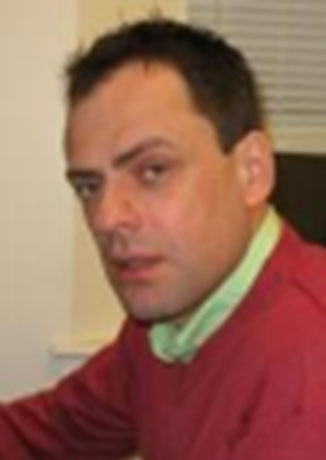
ABSTRACT
We introduce a Stochastic Reaction-Diffusion- Dynamics Model (SRDDM) for GPU- accelerated simulations of mechanochemical processes in macrosopic biological systems with high spatial and temporal resolution. The SRDDM model is mapped into the CellDynaMo package, which couples the spatially inhomogeneous reaction-diffusion master equation to account for biochemical reactions and molecular transport with the Langevin Dynamics (LD) framework to describe relevant dynamic mechanical processes. This computational infrastructure allows the simulation of hours of the dynamics of large and complex biological in reasonable wall-clock time. We apply the model to test performance of the Search-and-Capture model of mitotic spindle assembly by simulating, in three spatial dimensions, dynamic instability of elastic microtubules anchored in two centrosomes, movement and deformations of geometrically realistic centromeres with flexible kinetochores and chromosome arms. Furthermore, the SRDDM model describes the mechanics and kinetics of Ndc80 linkers mediating transient attachments of microtubules to the chromosomal kinetochores. The rates of these attachments and detachments depend upon phosphorylation states of the Ndc80 linkers, which are regulated in the model by explicitly accounting for the reactions of Aurora A and B kinase enzymes, which undergo restricted diffusion. We find that there is an optimal rate of microtubule-kinetochore detachments which maximizes the accuracy of the chromosome connections, that adding chromosome arms to kinetochores improve the accuracy by slowing down chromosome movements, that Aurora A and kinetochore deformations have a small positive effect on the attachment accuracy, and that thermal fluctuations of the microtubules increase the rates of kinetochore capture and also improve the accuracy of spindle assembly. The SRDDM model implemented in the CellDynaMo package can now be used to model a large number of physico-chemical processes that occur in complex biological systems. Selected model applications to the blood clot contraction and forced rupture of fibrin network are described.
Kuruom School of Advanced Sciences, Lucknow, India & Institute of Advanced Sciences (INADS), Dartmouth, MA, USA
Date: (26-04-2023), TIME: 5 Pm (IST)
Zoom Link – ID: 899 9430 0189, Passcode:
742162
Live on: Facebook & Youtube: @KSASTALK
SPEAKER’S PROFILE
Dr Prashant Shukla is working as Associate Professor of Philosophy at University of Lucknow for the last 12 years. He is the official Visiting Faculty of BITS-Pilani and Bhartkhande Music Institute. He is also the Asst. Dean of College Development Committee (L.U.), Gender Sensitization Cell. He has worked in St. Stephens College and Hindu College of Delhi University (upto 2010). His areas of specialization are Classical Greek Philosophy, Post- modernism, and Symbolic Logic. He did his Doctoral Research from Centre for Philosophy, SSS, JNU (2006) & ost-doctoral Research from Kapodistrian University of Athens, Greece (2008).
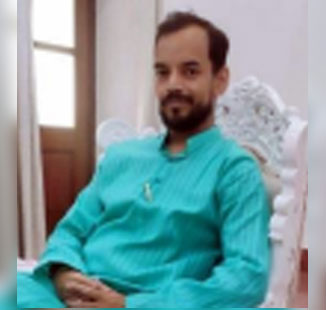
ABSTRACT
Our current period in the history of philosophy has been called by many as ‘the postmodern age’ and many contemporary thinkers (Indian and Western) are interested in making sense of it in the times inwhich they live. Postmodernism is to be understood as ‘... (just a) different way of looking at the things’ where the core issues interchange their place with (erstwhile) marginal issues ofphilosophy. Although an admirable endeavour, such critics inevitably run into difficulties given thesheer complexity of living in history: we do not yet know which elements in our culture will prevail and we do not always recognize the subtle butinsistent ways that changes in our society affect our ways of thinking and being in the word.
